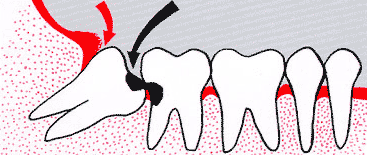| Wisdom
Teeth
What are Wisdom Teeth?
They are the third permanent molars and are the last teeth to develop.
They erupt or come up into the mouth in our late teens or early
twenties. We can have up to four wisdom teeth, two in the upper
jaw and two in the lower.
Why should they be removed?
For those of us whose jaws are too small to accommodate these wisdom
teeth, problems may arise:
Often, the lower wisdom tooth may be prevented from erupting when
it is " blocked " by the tooth in front.In such a case,
the tooth is called an impacted wisdom tooth. Such a tooth sometimes
give an unpleasant sensation of pressure at the back of the jaw.
The gum around the impacted wisdom tooth may trap food debris
which can cause infection of the gums. (See red arrow) The infection
would be felt as a swelling and pain of the gum.
Further discomfort may be caused if the upper wisdom tooth bites
down on the swollen gum below.
 |
Tooth decay may develop on
the wisdom tooth and the back surface of the tooth in front
of it. (See black arrow)
The decay can often go undetected and may only be discovered
when there is a toothache. In severe cases, both teeth may
need to be removed. |
What can be done about an infected Wisdom Tooth?
Your dentist may clean the infected area and apply some local antiseptic
agent if necessary.
Antibiotics and painkillers may be prescribed to reduce the infection.
If the upper wisdom tooth is biting on the swollen gum, the tooth
may be trimmed out of the way. If it is judged that the upper wisdom
tooth is not functional, then, in the long run it would be better
to extract the tooth.
At a later visit, when the infection is under control, the lower
wisdom tooth can be removed. Very often, before the removal, an
X-ray would be taken to assess the position and shape of the tooth.
How is the Wisdom Tooth removed?
In many cases, the wisdom tooth is removed by your dentist in an
operation done under local anaesthesia. The anaesthesia will prevent
any feeling of pain during the operation though there may be some
sensation of pressure while the dentist is working on the tooth.
During the operation, the gum around the tooth is moved to one
side and some bone around the tooth is removed. Often, the tooth
may need to be divided into pieces before it can be removed. The
gum is then stitched back into place.
After the operation, when the anaesthetic has worn off, you may
need to take painkillers. Antibiotics may also be given to prevent
infection of the wound. There is usually some swelling of the cheek
which may last about 5 days. The swelling may also cause some stiffness
of the jaw.
Your dentist will check on your condition about 5 days later. At
this time, the stitches will be removed.
What you need to do?
Before the operation
Inform your dentist about any heart condition or any serious illness
you have or had.
Inform your dentist about any drug allergies you may have.
Have a good meal and brush your teeth.
After the operation
A little oozing of blood is normal and should be expected. This
can be stopped by biting on a piece of gauze placed on top of the
wound, for about 20 to 30 minutes.
Do not wash the mouth too vigorously or use your tongue to disturb
the wound as these would dislodge the blood clot and cause further
bleeding.
Call your dentist if you think the wound is bleeding badly.
You may place an ice-cold towel or ice-pack over your cheek to help
reduce the swelling. Do not put warm compresses on the cheek as
this will worsen the swelling.
Take all the medicines given to you at the proper time. If antibiotics
have been given to you, complete the whole course.
Keep to a soft diet avoiding friable food such as crisps and biscuits
Do not exercise vigorously or do heavy work.
Do not smoke or consume alcohol.
After the first day of the operation, rinse your mouth gently after
every meal to remove any trapped food at the wound with luke warm
salt water. Continue to brush your teeth in the other parts of the
mouth. |


